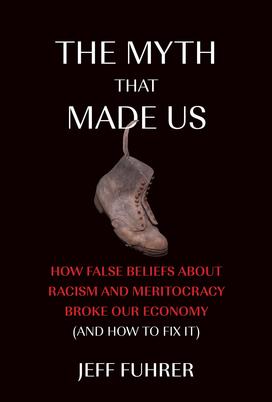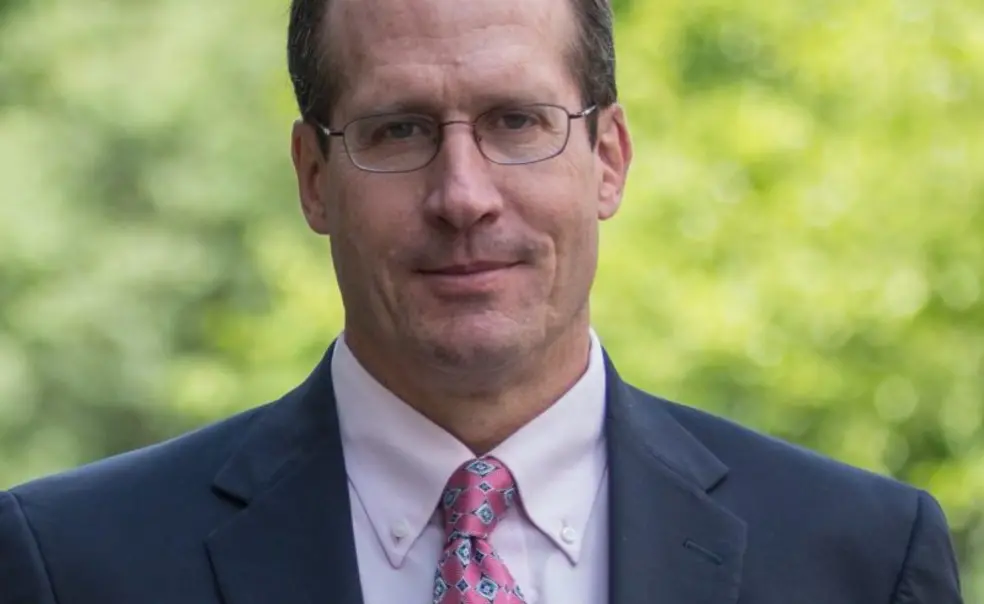Jeff Fuhrer ’79 Unpacks Race and Economics in Latest Book
The book: In The Myth that Made Us (The MIT Press), Jeff Fuhrer ’79 argues systemic racism is the root problem contributing to disparate outcomes in the U.S. economy. His goal is to offer solutions and chart a path forward. Using data, insights from community voices, and other evidence to back his claims, Fuhrer explains the possibility of a new system that would be equitable for all. Universal access to childhood education, restructuring low-wage workplaces, and providing affordable housing are among the key areas Fuhrer addresses in The Myth that Made Us.

The author: Jeff Fuhrer ’79 earned his undergraduate degree and Ph.D. in economics from Princeton and Harvard. He is a fellow at the Brookings Institution and a foundation fellow at the Eastern Bank Foundation. He was previously executive vice president and director of research at the Federal Reserve Bank of Boston.
Excerpt:
I spent more than three decades with the Federal Reserve System as an executive and as a widely cited research economist. My training was mainstream. I learned economics from leading scholars at Princeton and Harvard. The work I ultimately pursued married academic research into the workings of the macroeconomy with advising on real-time decision making about monetary policy. As director of the research department at the Federal Reserve Bank of Boston, I attended dozens of the Fed’s monetary policymaking meetings—the Federal Open Market Committee meetings—in DC under each of the past five chairs, observing up close how the sausage is made. All of this was rewarding and fascinating.
Then, about fifteen years ago, the Fed initiated a new direction in its community development arm. The Boston Fed, where I was also executive vice president, partnered with a host of institutions in midsized, postindustrial New England cities to figure out how to bring back economic vitality. This data-based, collaborative, practical, on-the-ground effort, for which I served as a senior advisor, was enlightening for me. Most importantly for my personal journey, I was fortunate to be involved in numerous in-person discussions with residents and leaders of these low-income, often majority-minority, communities. The more I learned about their lives, the more I became aware of gaps in mainstream economics. The problem in these communities was not a lack of industry, perseverance, or innovation. It was structural. Simply put, the economy itself had set them up to fail by denying opportunities for success.
***
By 2013, I was now responsible for the Fed’s community development area when it embarked on a new project to measure the size of racial wealth disparities in the Boston metro area. This work, which followed in the footsteps of efforts by William A. Darity Jr. and Darrick Hamilton and was co-led by them and by Boston Fed staffer Ana Patricia Muñoz, once again exposed structural problems with our economy. A companion project brought together leaders from the region to discuss the roots of racial wealth disparities. Through those discussions and our reading of the sad history of institutional racism, it became clear to all of us that the racial wealth gap was the product of decades of policy design and implementation that boosted white families’ wealth but largely excluded black families. While the troubling outcomes were economic, the sources were political and were intentionally discriminatory. Nowhere had I heard about this in my prior years as an economist.
Finally, in the fall of 2017, our community development group joined several other Reserve Banks in a project on the characteristics of low-wage work. Standard economic theory asserts that markets will efficiently determine the characteristics of jobs, including the compensation they offer, but that seemed far removed from the reality of low-wage jobs. Over time, employers had scaled back wages, reduced benefits, contracted out low-wage jobs, and dismantled the unions that had earlier provided voice and bargaining power to workers. While vast amounts of economic research have focused on improving education and skills to solve this problem—and while better training is no doubt part of the solution—it became clear that much of the blame lay with the norms our nation had come to accept for how employers treat their employees in many sectors of the economy.
***
As I learned about the broken parts of our economy, I felt compelled to speak up. In the course of my career, I had spoken to hundreds of groups about conditions in the national economy. I continued to do so but now devoted the latter half of my presentations to a discussion of the reality of low-income, disproportionately minority workers, along with the history of systemic racism and its impact on wealth accumulation among people of color. In all of those talks, I emphasized the role that corrosive (and ignorant) narratives have played in explaining away and perpetuating gross inequities—especially this narrative: that all you need to do is work hard and let the markets work their magic, and everything will be great.
These presentations seemed to fill a need among my audiences. Perhaps some already had an appreciation for our societal injustices and inequities, but few had been provided a blueprint of the economic engine that drove those injustices and inequities. At each talk, numerous attendees told me that they had never been confronted with the evidence, or that they knew things were wrong but they weren’t sure just how or why. And many listeners thanked me for putting the big picture together in an accessible, albeit disheartening, way.
The feedback deepened my sense of purpose and convinced me that I needed to get this message out to more people. With the encouragement of colleagues, friends, and family who had also heard me speak about these issues (perhaps a bit too much), I decided that the best way to do so was to write this book. It is a labor born of passion for the subject, coupled with outrage that our economic system has been designed to leave so many, many behind. The widely held narrative that attributes lack of success to lack of effort is an embarrassment. It’s not a lack of diligence or judgment that creates these miseries. We made it this way.
The good news, as the book will discuss, is that we can remake our country so that it more closely resembles the land of opportunity to which we all aspire. And I am proud to be a small part of that mission.
Excerpted from The Myth that Made Us by Jeff Fuhrer. Copyright © 2023 by The MIT Press. Reprinted with permission from the publisher.
Reviews:
“Increasingly, race and economic opportunity are at the center of our national economic conversation. In the important book, Jeff Fuhrer takes on dogmas he believes have stalled progress and points the way towards new transformative policies. Agree or disagree, Fuhrer’s arguments deserve close attention.” — Larry Summers, university professor and president emeritus at Harvard University
“The Myth That Made Us compels us to recognize that wealth and affluence are built upon compounded advantages provided to the successful by others — not simply one’s own hard work and talent. Opening with a surprising reinterpretation of the Horatio Alger stories, this is a rigorous, profound, and entertaining study in truth-telling about social disparity in America.” — William Darity Jr., Samuel DuBois Cook Professor of Public Policy, African and African American Studies, economics, and business at Duke University










No responses yet